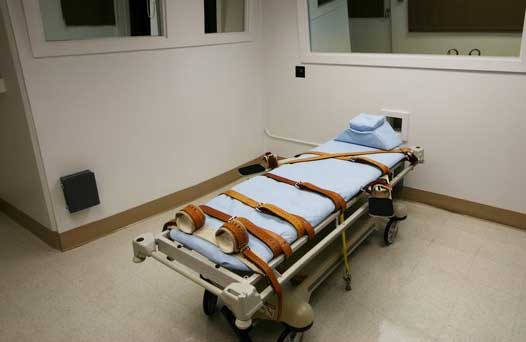Senate Seeks Unanimous Juries In Death Sentences
February 6, 2016
With executions indefinitely on hold in Florida, lawmakers are hurriedly considering legislation to address a recent U.S. Supreme Court decision that struck down the state’s capital sentencing law as unconstitutional.
But the House and Senate are divided about how far the changes should go.
 The Senate Criminal Justice Committee on Monday will take up a measure that would require unanimous jury recommendations for the death penalty to be imposed. A House panel this week approved a plan that would shift the current threshold of a simple majority to a 9-3 jury vote for death.
The Senate Criminal Justice Committee on Monday will take up a measure that would require unanimous jury recommendations for the death penalty to be imposed. A House panel this week approved a plan that would shift the current threshold of a simple majority to a 9-3 jury vote for death.
The issue centers on the sentencing phase of death-penalty cases after defendants are found guilty. Of the 31 states that have the death penalty, Florida is one of only three that do not require juries to be unanimous in determining whether inmates will be sentenced to death. The other two states — Alabama and Delaware — require at least nine jurors to vote in favor of death.
The Jan. 12 U.S. Supreme Court ruling, in the case known as Hurst v. Florida, did not address the issue of unanimity but focused on the state’s law giving judges — and not juries — the power to impose the death penalty, based on juries’ recommendations.
The 8-1 ruling dealt with what are known as “aggravating” circumstances that must be determined before defendants can be sentenced to death. A 2002 U.S. Supreme Court ruling, in a case known as Ring v. Arizona, requires that determination of such aggravating circumstances be made by juries, not judges.
Under Florida law, juries make recommendations regarding the death penalty, based on a review of aggravating and mitigating circumstances, but judges ultimately decide whether defendants should be put to death or sentenced to life in prison.
The Florida Supreme Court on Tuesday indefinitely postponed the scheduled Feb. 11 execution of Cary Michael Lambrix, shortly after hearing arguments that concentrated on the impact of the Hurst decision on Death Row inmates. The Hurst decision is expected to spark a flurry of appeals from inmates condemned to death.
The Senate proposal (SB 7068) would require juries to unanimously decide that at least one aggravating factor exists before a defendant can be eligible for the death penalty. Under current law, a majority of jurors have to decide that at least one aggravator exists, but juries are not required to provide information about the votes on each of the aggravators.
Unlike the House plan (PCB CRJS 16-07), the Senate measure would also require unanimous jury recommendations in order for the death penalty to be imposed.
“The Senate feels that if we go to 9-3 that we’ll be back in a few years, going through this again,” Senate Criminal Justice Chairman Greg Evers, R-Baker, told The News Service of Florida in an interview Friday.
Evers held a workshop last week to get input from defense lawyers, prosecutors, judges and other death penalty experts. The only one who did not recommend that Florida switch to unanimous recommendations in death sentences was 5th Judicial Circuit State Attorney Brad King.
Because nearly all of the other states with the death penalty require unanimity for death sentences, being so outside of the mainstream puts Florida at risk in a future Supreme Court ruling, the other experts advised.
“Being an outlier, we felt that it was best if we just went ahead and went with unanimity,” Evers said Friday.
The unanimity issue “is up for discussion,” but “the fact is that if we don’t go with unanimity, then we would be opening ourselves up to have it all thrown out again,” he said.
But House Criminal Justice Chairman Carlos Trujillo, whose committee signed off on his chamber’s plan Tuesday, said there’s no way for lawmakers to predict what the Supreme Court will do in years to come.
“We can’t legislate in the world of possibilities,” Trujillo, a former prosecutor, said in an interview Friday. “The good thing is (unanimity) is the only piece that’s really different in the two bills. Overall, the bills are very, very similar. So it makes both of our lives a lot easier.”
Trujillo said the chambers will “meet at some sort of middle ground” to fix the law, now temporarily on hold, before the legislative session ends on March 11.
“We have to. We absolutely have to,” Trujillo, R-Miami, said.
by Dara Kam, The News Service of Florida
Comments
2 Responses to “Senate Seeks Unanimous Juries In Death Sentences”



Exactly. A majority. One tree hugging, love everyone, bleeding heat, liberal hippie, yuppie, suburbanite can hold hostage the entire judicial system now. Great for murderers. Why not just make murder legal like purge ? Whats the deterrent ? Free room and board, food, healthcare, recreation. And you expect the crime rate to decline ? Really ?
Florida needs to take a look at the verdict in the James Holmes case in Colorado. The verdict in that case was 11-1 in favor of death. 11 people came to the conclusion that his crime warranted a death sentence and came to live with there decision, and 1 person stopped it. Do you think those 11 people will want to serve on a jury ever again. I certainly would not. A vote of 7-5 is what it should be.